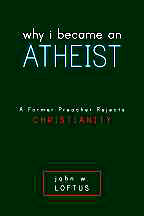Briefly Scrutinizing Biblical Miracles
Miracle reports are often offered as corroboration for the Gospel message of salvation. For example, "doubting" Thomas was admonished for questioning reports that Jesus was raised from the dead: "Blessed are those who have not seen and yet have believed." And in other parts of the New Testament, faith in what one has not seen for himself is often praised: "We walk by faith, not by sight." Since an argument from the Bible assumes the soundness of an argument from miracles, if the latter fail, then all religions grounded in the biblical text are undercut.







